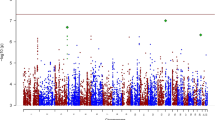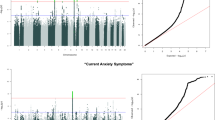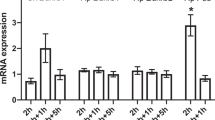Abstract
Growing animal data implicate cholecystokinin in the regulation of anxiety, while human clinical research confirms the role of cholecystokinin in the provocation of panic attacks. Antipanic medications suppress the ability of cholecystokinin to induce panic attacks, and may alter the expression of the cholecystokinin gene. Thus, there is increased interest in understanding the molecular genetic component of these observations. Recent association studies using persons with panic disorder described some association between polymorphisms in the genes encoding cholecystokinin and the cholecystokinin B-receptor and panic disorder. In this study, we used a family-based design, employing 596 individuals in 70 panic disorder pedigrees, as well as 77 haplotype relative risk ‘triads’. Subjects were genotyped for two polymorphisms: the polymorphic microsatellite marker in the CCK-BR locus using PCR-based genotyping and at a single nucleotide polymorphism in the CCK promoter using a fluorescence polarization detection assay, and the data were analyzed for genetic association and linkage. Employing a variety of diagnostic and genetic models, linkage analysis produced no significant lod scores at either locus. Family-based tests of association, the haplotype-based haplotype relative risk statistic and the transmission disequilibrium test, were likewise non-significant. The results reported here provide little support for the role of these polymorphisms in panic disorder.
This is a preview of subscription content, access via your institution
Access options
Subscribe to this journal
Receive 12 print issues and online access
$259.00 per year
only $21.58 per issue
Buy this article
- Purchase on Springer Link
- Instant access to full article PDF
Prices may be subject to local taxes which are calculated during checkout
Similar content being viewed by others
References
Weissman MM, Bland RC, Canino GJ, Faravelli C, Greenwald S, Hwu H-G et al. The cross-national epidemiology of panic disorder Arch Gen Psychiatry 1997 54: 305–309
Knowles JA, Weissman MM . Panic disorder and agoraphobia. In: Oldham JM, Riba MB (eds) Review of Psychiatry Vol 14: American Psychiatric Press: Washington, DC 1995 pp 383–404
Goldstein RB, Wickramaratne PJ, Horwath E, Weissman MM . Familial aggregation and phenomenology of ‘early-onset’ (at or before age 20 years) panic disorder Arch Gen Psychiatry 1997 54: 271–278
Horwath E, Adams P, Wickramaratne P, Pine D, Weissman MM . Panic disorder with smothering symptoms: evidence for increased risk in first-degree relatives Depress Anxiety 1997 6: 147–153
Kendler KS, Neale MC, Kessler RC, Heath AC, Eaves LJ . Panic disorder in women: a population-based twin study Psychol Med 1993 23: 397–406
Vieland VJ, Hodge SE, Lish JD, Adams P, Weissman MM . Segregation analysis of panic disorder Psychiatr Genet 1993 3: 63–71
Vieland VJ, Goodman DW, Chapman T, Fyer AJ . New segregation analysis of panic disorder Am J Med Genet 1996 67: 147–153
Knowles JA, Fyer AJ, Vieland VJ, Weissman MM, Hodge SE, Heiman GA et al. Results of a genome-wide genetic screen for panic disorder Am J Med Genet (Neuropsychiatr Genet) 1998 81: 139–147
Deckert J, Catalano M, Heils A, Di Bella D, Friess F, Politi E et al. Functional promoter polymorphism of the human serotonin transporter: lack of association with panic disorder Psychiatr Genet 1997 7: 45–47
Hamilton SP, Heiman GA, Haghighi F, Mick S, Klein DF, Hodge SE et al. Lack of genetic linkage or association between a functional serotonin transporter polymorphism and panic disorder Psychiatr Genet 1999 9: 1–6
Ishiguro H, Arinami T, Yamada K, Otsuka Y, Toru M, Shibuya H . An association study between a transcriptional polymorphism in the serotonin transporter gene and panic disorder in a Japanese population Psychiatr Clin Neurosci 1997 51: 333–335
Kato T, Wang ZW, Zoega T, Crowe RR . Missense mutation of the cholecystokinin B receptor gene: lack of association with panic disorder Am J Med Genet 1996 67: 401–405
Ohara K, Xie DW, Ishigaki T, Deng ZL, Nakamura Y, Suzuki Y et al. The genes encoding the 5HT1D alpha and 5HT1D beta receptors are unchanged in patients with panic disorder Biol Psychiatry 1996 39: 5–10
Wang Z, Valdes J, Noyes R, Zoega T, Crowe RR . Possible association of a cholecystokinin promotor polymorphism (CCK36CT with panic disorder Am J Med Genet (Neuropsychiatr Genet) 1998 81: 228–234
Bourin M, Baker GB, Bradwejn J . Neurobiology of panic disorder J Psychosom Res 1998 44: 163–180
de Montigny C . Cholecystokinin tetrapeptide induces panic-like attacks in healthy volunteers. Preliminary findings Arch Gen Psychiatry 1989 46: 511–517
Bradwejn J, Koszycki D, Meterissian G . Cholecystokinin-tetrapeptide induces panic attacks in patients with panic disorder Can J Psychiatry 1990 35: 83–85
Bradwejn J, Koszycki D, Shriqui C . Enhanced sensitivity to cholecystokinin tetrapeptide in panic disorder. Clinical and behavioral findings Arch Gen Psychiatry 1991 48: 603–610
Abelson JL, Nesse RM . Pentagastrin infusions in patients with panic disorder. I. Symptoms and cardiovascular responses Biol Psychiatry 1994 36: 73–83
Bradwejn J, Koszycki D, Couetoux du TA, van Megen H, den Boer J, Westenberg H . The panicogenic effects of cholecystokinin-tetrapeptide are antagonized by L-365,260, a central cholecystokinin receptor antagonist, in patients with panic disorder Arch Gen Psychiatry 1994 51: 486–493
Cowley DS, Adams JB, Pyke RE, Cook J, Zaccharias P, Wingerson D et al. Effect of Cl-988, a cholecystokinin-B receptor antagonist, on lactate-induced panic Biol Psychiatry 1996 40: 550–552
Pande AC, Greiner M, Adams JB, Lydiard RB, Pierce MW . Placebo-controlled trial of the CCK-B antagonist, Cl-988, in panic disorder Biol Psychiatry 1999 46: 860–862
van Megen HJ, Westenberg HG, den Boer JA, Slaap B, Es-Radhakishun F, Pande AC . The cholecystokinin-B receptor antagonist Cl-988 failed to affect CCK-4 induced symptoms in panic disorder patients Psychopharmacology (Berl) 1997 129: 243–248
Bradwejn J, Koszycki D . Imipramine antagonism of the panicogenic effects of cholecystokinin tetrapeptide in panic disorder patients Am J Psychiatry 1994 151: 261–263
Shlik J, Aluoja A, Vasar V, Vasar E, Podar T, Bradwejn J . Effects of citalopram treatment on behavioural, cardiovascular and neuroendocrine response to cholecystokinin tetrapeptide challenge in patients with panic disorder J Psychiatry Neurosci 1997 22: 332–340
van Megen HJ, Westenberg HG, den Boer JA, Slaap B, Scheepmakers A . Effect of the selective serotonin reuptake inhibitor fluvoxamine on CCK-4 induced panic attacks Psychopharmacology (Berl) 1997 129: 357–364
Kennedy JL, Bradwejn J, Koszycki D, King N, Crowe R, Vincent J et al. Investigation of cholecystokinin system genes in panic disorder Mol Psychiatry 1999 4: 284–285
Mannuzza S, Fyer AJ, Klein DF, Endicott J . Schedule For Affective Disorders and Schizophrenia–Lifetime Version Modified for the Study of Anxiety Disorders (SADS-LA): Rationale and Conceptual Development J Psychiat Res 1986 20: 317–325
Mannuzza S, Fyer AJ, Endicott J, Klein DF . Family Informant Schedule and Criteria Anxiety Disorders Clinic, New York State Psychiatric Institute 1985
Fyer AJ, Weissman MM . Genetic linkage study of panic: clinical methodology and description of pedigrees Am J Med Genet (Neuropsychiatr Genet) 1999 88: 173–181
Glaser B, Anker R, Chiu KC, Donis-Keller H, Permutt MA . Dinucleotide repeat polymorphism at the human CCKBR locus Hum Mol Genet 1994 3: 2081
Chen X, Levine L, Kwok PY . Fluorescence polarization in homogeneous nucleic acid analysis Genome Res 1999 9: 492–498
Cottingham RW Jr, Idury RM, Schaffer AA . Faster sequential genetic linkage computations Am J Hum Genet 1993 53: 252–263
Schaffer AA, Gupta SK, Shriram K, Cottingham RW Jr . Avoiding recomputation in linkage analysis Hum Hered 1994 44: 225–237
Ott J . Analysis of Human Genetic Linkage, 3rd edn Johns Hopkins University Press: Baltimore 1999
Terwilliger JD . The available possibilities to analyze data of polygenic disease statistically Abstract to IVth Workshop of the Nordic Genome Initiative, Helsinki 1994
Spielman RS, McGinnis RE, Ewens WJ . Transmission test for linkage disequilibrium: the insulin gene region and insulin-dependent diabetes mellitus (IDDM) Am J Hum Genet 1993 52: 506–516
Terwilliger JD . A powerful likelihood method for the analysis of linkage disequilibrium between trait loci and one or more polymorphic marker loci Am J Hum Genet 1995 56: 777–787
Terwilliger JD, Ott J . A haplotype-based ‘haplotype relative risk’ approach to detecting allelic associations Hum Hered 1992 42: 337–346
Jin K, Speed TP, Klitz W, Thomson G . Testing for segregation distortion in the HLA complex Biometrics 1994 50: 1189–1198
Sham PC, Curtis D . Monte Carlo tests for associations between disease and alleles at highly polymorphic loci Ann Hum Genet 1995 59: 97–105
Nielsen FC, Pedersen K, Hansen TV, Rourke IJ, Rehfeld JF . Transcriptional regulation of the human cholecystokinin gene: composite action of upstream stimulatory factor, Sp1, and members of the CREB/ATF-AP-1 family of transcription factors DNA Cell Biol 1996 15: 53–63
Giardino L, Bettelli C, Pozza M, Calza L . Regulation of CCK mRNA expression in the rat brain by stress and treatment with sertraline, a selective serotonin re-uptake inhibitor Brain Res 1999 824: 304–307
Bowen T, Norton N, Jacobsen NJ, Guy C, Daniels JK, Sanders RD et al. Linked polymorphisms upstream of exons 1 and 2 of the human cholecystokinin gene are not associated with schizophrenia or bipolar disorder Mol Psychiatry 1998 3: 67–71
Ishiguro H, Saito T, Shibuya H, Toru M, Arinami T . No association between C-45T polymorphism in the Sp1 binding site of the promoter region of the cholecystokinin gene and alcoholism Psychiatry Res 1999 85: 209–213
Okubo T, Harada S, Higuchi S, Matsushita S . Genetic association between alcohol withdrawal symptoms and polymorphism of CCK gene promoter Alcohol Clin Exp Res 1999 23: (4 Suppl) 11S–12S
Acknowledgements
The authors would like to thanks Xiangning Chen (CuraGen Genomics, New Haven, CT, USA) and Yan Zhang-Klompus (LJL BioSystems) for helpful discussion about FP-TDI and the rest of the staff at LJL BioSystems for the loan of the Analyst AD high-throughput detection platform. We also acknowledge the invaluable contribution made by the families who participated in this study. This study was supported by grants from the NIMH: MH28274 (MMW), MH37592 (AJF), MH30906 (DFK), and MH48858 (SEH); and from the National Alliance for Research on Schizophrenia and Depression (SPH).
Author information
Authors and Affiliations
Corresponding author
Rights and permissions
About this article
Cite this article
Hamilton, S., Slager, S., Helleby, L. et al. No association or linkage between polymorphisms in the genes encoding cholecystokinin and the cholecystokinin B receptor and panic disorder. Mol Psychiatry 6, 59–65 (2001). https://doi.org/10.1038/sj.mp.4000788
Received:
Revised:
Accepted:
Published:
Issue Date:
DOI: https://doi.org/10.1038/sj.mp.4000788
Keywords
This article is cited by
-
Advances in molecular genetics of panic disorder
Molecular Psychiatry (2010)
-
Evidence for association of DNA sequence variants in the phosphatidylinositol-4-phosphate 5-kinase IIα gene (PIP5K2A) with schizophrenia
Molecular Psychiatry (2006)
-
Gastrin: old hormone, new functions
Pfl�gers Archiv - European Journal of Physiology (2005)
-
Evidence for Genetic Linkage Between a Polymorphism in the Adenosine 2A Receptor and Panic Disorder
Neuropsychopharmacology (2004)
-
Neuropeptide gene polymorphisms and human behavioural disorders
Nature Reviews Drug Discovery (2003)



